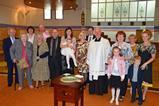The Bishop of Durham, the Rt Revd Paul Butler, is no stranger to children’s work. From 1987 to 1994, he worked for children’s and youth work charity, Scripture Union, and is now advocate for children among Church of England bishops. Alex Taylor caught up with Paul to talk about the children and families’ ministry landscape

AT: How do you think children’s work has changed since you worked at Scripture Union?
PB: The fundamentals haven’t changed – relationship matters more than anything else. Sharing the good news of Jesus hasn’t changed, but the numbers that churches are engaged with directly on Sunday mornings has diminished across every denomination. Yet, the numbers of those engaged with the church in other contexts has risen quite sharply. I was at an Anglican church in Durham not long ago to visit their Messy Church and their extension of Messy Church, which they call ‘Splat’. They have a very small number of children who come on a Sunday morning but a significant number who come to Messy Church with their parents and grandparents. So the kind of thing that children are coming to and engaging with has changed quite noticeably.
The other thing is that in the last few years there’s definitely been a recovery of the role and importance of family ministry. That’s quite a noticeable change, certainly from when I was on staff at Scripture Union.
AT: Are churches starting to focus more on the family than just the child or is that still something people have to get their heads around?
PB: For some it certainly has happened. They have cottoned on to the idea of engaging with whole families, whatever the shape of the family is, while others are still trying to get their heads around it. It was very uncommon back in the 1970s to find any church that wouldn’t have at least some children attached to it. Now you’re looking at something like 50 per cent with no children, which is a fundamental change.
It may well be that be that churches have lost contact with children as a whole, and it might be a better way back in to think about how we can engage with the families in our area rather than how we can just the children in our area.
AT: Is the gradual loss of children due to the gradual decline in numbers attending churches or has children’s work got something wrong?
PB: It’s partly to do with the decline in numbers attending church and the average age increasing, but we mustn’t beat ourselves up too much about that, because the average age of the population is increasing. We are living longer. When I was a child, 60-year-olds were ‘old’. Now they’re fit and active and doing all kinds of stuff. We are in a different world of health and longevity.
We also have to be careful here; when I was a teenager, church was boring but there was still an ethos of going, even if it was boring. Now if it’s boring, children aren’t going to go. The question of personal choice and personal freedom, and allowing children to make their own choices and decisions, has changed quite significantly. I didn’t grow up in a churchgoing home so I was never made to go. I was sent to Sunday School but I don’t think my parents would have insisted if I didn’t want to go.
That was the era when Sunday School was a separate event from church anyway, and that might be part of the issue. Vast numbers of my peers never saw themselves as part of church, they were part of Sunday school. The whole recovery of emphasis on family is to say children are part of the whole family of God and they need to be included and valued for who they are now and not what they might become. Hence, I think the way back in for churches who have lost any contact is to rethink how they can engage with a whole generation of parents and children together and see them all as part of church, and gear their worship that way.
AT: Have you seen any good examples of intergenerational worship happening?
PB: I’m a great fan of Messy Church. All the questions that people ask about it, because it’s only monthly, are the right questions to ask. But there is something about it which is grabbing people and is attracting families to come, families who wouldn’t come to a more traditional church service and wouldn’t send their children to Sunday school. I think this partly is about changing levels of trust too. Parents want to be with their children rather than handing them over. I see lots of good Messy Churches going on. Not every Messy Church is great, but lots of them are.
I do occasionally see good intergenerational worship happening. For example, in Stockton Parish Church, there’s a real sense that all ages are engaged and part of what is going on. People do go off for peer learning at some point, but there is a real sense that they’re all gathered together and all in it together. There’s ownership by every age of what’s going on. But I have to say that from my position now as a bishop, I can’t just wander in and watch what’s going on. When I arrive, I can’t avoid the fact that it’s the bishop turning up!
AT: Do you think that the professionalisation of children’s work is an issue? Do some abdicate responsibility for spiritual development to full-time workers?
PB: Churches are making a mistake if they think that employing a children’s or youth worker means that this person will do it all for them. That’s a dangerous kind of professionalisation. But there’s much better training available now, which wasn’t available 25-30 years ago, and the possibility of having a high quality, professional worker is much higher. If churches take on such a worker, with a view to saying, ‘equip us and enable us as the body of Christ to do this together – don’t do it for us but do it with us’, then that’s a really good professionalisation. I have to say, I see examples of both models and it’s the latter, where those who have been professionally trained are enabling the whole church to see it as their ministry, who are doing it well.
Ten years ago, no one would have thought that there would be 3,500 Messy Churches
AT: You’ve said that you’re still a children’s worker but you just do it in a different way. In what ways does a bishop do children’s work?
PB: I still visit schools and do collective worship. I engage with kids in classes and answer their questions, in the same way that a local vicar or children’s worker may do. Inevitably, because I’m a bishop, they want to know about ‘bishop-ing’ things. I always talk about Jesus and say that’s what and who I’m about.
I see my role more as encouraging others in their work, supporting them, enabling them and speaking up for children and children’s workers. My ministry has broadened in how I work with them. I’ve become more and more passionate about vulnerable children and children around the world. As a bishop, I’ve now been given the responsibility of engaging in debates in the House of Lords about subjects such as child poverty, and that’s part of me speaking up for children in the broader sense. I can keep children and families high on everybody’s agenda, I can set an ethos in the dioceses. In the Durham diocese we have three core priorities, one of which is children and young people. It’s more about leadership – I can’t do as much hands-on ministry as I once did.
AT: How can we encourage clergy to engage with children’s work a bit more?
PB: I’m much more hopeful for the future now with Common Awards [an ongoing training and qualifications scheme in the Church of England], because it has children’s and youth ministry built in to it. Everyone who is training for the Church of England now will do some work around children and young people. What we do with clergy during their curacies is really important in terms of helping them engage with schools and see how children and young people fit into the life of the local church. It’s about training and development and I know for other denominations.
One thing I want to ask all church leaders is to look at the agenda of their local church council meetings and see how often issue of children and young people appear, and what vision they have for it. If we’re about reaching whole communities with the good news of Jesus, we can’t do that unless we’re actively engaging with the children and young people in it. Where do they feature in mission-thinking and mission-planning? Also, look at your budget and how much you’re spending.
AT: What would you like to see over the next ten years in children and families’ work?
PB: I long for and pray for a regrowing of the numbers of people engaged with church in all its various forms. If we’re currently at roughly 50 per cent of churches not engaging with children in any direct way, I would hope that in ten years this would shrink to 40 or 30 per cent, meaning the number of churches engaging with children and families has risen and that those that are already doing it will have seen their numbers grow. In terms of shape and form, I don’t know what it will look like. Ten years ago, no one would have thought that there would be 3,500 Messy Churches. Other things will emerge like that and it will be exciting to see what they are.










































